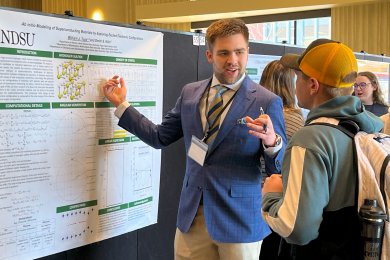Donald Warne, chair of the Department of Public Health, is scheduled to be an expert panelist at a White House Domestic Policy Council panel focused on rural child poverty.
“Opportunity for All: Building a Brighter Future for Rural Families” is set for Feb. 22-23 in Washington, D.C. Warne’s panel is titled “Rural Poverty: Prevalence and Implications for Child Well-Being.” The session will present new findings on the growth of concentrated poverty outside urban areas and the implications of poverty for children’s future economic opportunities.
Other panelists slated to present with Warne include representatives of the National Governors Association, Tennessee Department of Economic and Community Development, the National Association of Counties and the University of New Hampshire. Other speakers at the event include governors and federal officials.
More than 400 county officials, federal and state policy makers and experts in the field of rural poverty and evidence-based approaches are expected to attend.
The event is part of a series hosted by the National Association of Counties focused on combating rural chronic poverty. In coordination with the White House Rural Council and the National Governors Association, the events are aimed at raising awareness of the nature and consequences of some of the biggest challenges facing rural communities, including child poverty and substance abuse.
Warne is associate professor and holds the Mary J. Berg Distinguished Professorship in Women’s Health. He serves as the senior policy adviser to the Great Plains Chairmen’s Health Board. Warne also is an adjunct clinical professor at the Arizona State University Sandra Day O’Connor College of Law where he taught American Indian health policy. He is a member of the Oglala Lakota tribe from Pine Ridge, South Dakota, and comes from a long line of traditional healers and medicine men. Warne earned a medical degree from Stanford University in 1995 and a Master of Public Health from Harvard University in 2002.
The NDSU Department of Health offers on-campus and distance education with specializations in American Indian Public Health, Public Health in Clinical Systems, Health Promotion and Management of Infectious Diseases.
As a student-focused, land-grant, research university, we serve our citizens.



